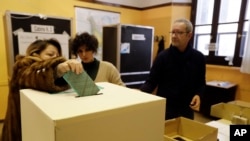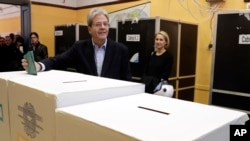Exit polls released as Italian polling stations closed Sunday suggested no one party will command a parliamentary majority but that populist parties scored major gains. The election was one of the most divisive in recent memory
According to the polls, the maverick, anti-establishment Movimento 5 Stelle (M5S) had done well, especially in the south of the country where turnout was higher than expected. M5S may have secured 29 to 31 percent of the vote, which would mean it will be the largest party in the Parliament, but will fall far short of a governing majority.
The center-left Democratic Party managed to stay above 20 percent, with polls suggesting it might secure as much as 23 percent of the vote. But it was overhauled by Silvio Berlusconi's right-wing alliance, which will likely control the largest bloc in the lower house of Parliament, the Chamber of Deputies. The right-wing alliance's performance marks a remarkable personal comeback by the 81-year-old Berlusconi, who is barred from office until next year but will clearly be one of the political ringmasters.
Analysts noted that exit polls in 2013 were inaccurate, but said they, too, expected Italy would have a hung Parliament.
A gray sky over much of the country reflected the gloomy mood of voters braving unsettled weather and intermittent rain as they turned out to vote. Many arriving at polling stations in the region of Lazio, which includes the capital Rome, said they were dissatisfied with the choices available to them even though there were 21 parties competing.
With no party likely to have secured a majority, Italians are now bracing for weeks of negotiations and horse-trading.
“I don’t trust any of the options I am being given,” said 38-year-old Agnese Rossi, an ecologist preparing to vote in Rome.
She said she expects the right-wing alliance led by former three-time prime minister Silvio Berlusconi and Matteo Salvini of the anti-migrant, euro-skeptic Lega to emerge as the overall winners and will be able to form the basis of a coalition government — a prospect that frightens her
But she says she has no faith in any of the parties competing in the sprawling, messy election, including the maverick upstart Movimento 5 Stelle (M5S), which analysts say may emerge as the largest single party. M5S has said publicly it will not participate in any backroom deal-making and won’t join a coalition government, although its leader Luigi Di Maio, a suave, boyishly telegenic 31-year-old university drop-out, has hinted that it could enter into some kind of governing arrangement.
“We will end up with greater conflict and division after this election,” said Rossi.
Migration concerns
Some other voters arriving at polling stations in towns just north of Rome complained the migration crisis had dominated the national debate too much and at the expense of other more pressing economic and social challenges facing the cash-strapped country. They said their greatest worry was over job creation.
The deep disaffection driving the national mood, real worry over the country’s economic prospects amid high youth unemployment and dysfunctional public services was channeled into anti-migrant fervor, with the migration issue acting as a lightning rod for public despair, some voters grumbled.
Berlusconi’s right-wing alliance, which includes his party Forza Italia, the Lega and the far-right Brothers of Italy, pushed a heavily anti-migrant agenda with the 81-year-old Berlusconi trying to keep up as the campaign unfolded with the more dramatic expulsion demands of his younger political partner, the 44-year-old Salvini. Both have said the 600,000 migrants, mainly from sub-Sahara Africa who have arrived in Italy the past two years, should be sent packing.
Other voters at the polling stations, though, argued migration is indeed the number one problem facing Italy and praised both the Lega and M5S for their tough anti-migrant rhetoric. In parts of the country during the campaign it has been hard to tell the difference between the far-right Lega and M5S when it has come to migration. M5S’s candidate for president of Lazio, Roberta Lombardi, adopted the election slogan, “More Tourists, Fewer Migrants,” arguing that tourism boosted the local economy, while migrants “weighed it down.”
She disputed a study by the IDOS Institute, an immigration think tank, that suggested overall immigrants bring in up to $3.45 billion more into the country than they cost the Italian state.
“Migrants have brought crime with them,” said Fabrizio Cannone, a 31-year-old farmworker and Lega supporter. “They are changing Italy and they should go,” he added.
The leaders of far-right and populist parties said as the polls opened they were confident of big gains. And certainly of all the Italians turning up at voting stations Sunday, supporters of the ruling Democratic Party (DP) appeared the gloomiest. “I always vote for the left so I will vote for the PD,” said Pino Barilla, a 60-year-old artist. "But PD voters are not fired up, not as enthusiastic as those of M5S or the Lega,” he added.
Analysts are predicting that at least one-quarter of those eligible to vote Sunday will not do so.
Radical populism
Twenty percent of the Italian electorate remained undecided on the eve of a vote that may put radical populism back on the political map of Western Europe, reversing recent center or establishment election wins in France and Germany, and complicating life for a European Union mired in Brexit negotiations and facing challenges from populist leaders in the former Communist states of the east.
One foreign observer of the election, Donald Trump’s former chief political strategist Steve Bannon told reporters Saturday that the Italian election result would mark another milestone on a populist and nationalist revolt roiling Europe and America. In his comments, he sought to link Italy’s election with Trump and the Brexit referendum to leave the European Union, saying they are all part of an anti-globalist revolt against elites.
He described the Italian election as “the most important thing happening politically in the world right now” and argued Italians are fed up with the EU and wanted to take back sovereignty, pointing out that whoever forms the government, probably two-thirds of Italians will have backed parties with populist views.
In fact, EU membership was not a major issue in the election and was largely avoided in the campaigning, even by the Lega. M5S played down its euro-skepticism during the campaign, and Berlusconi presented himself and Italy as pro-EU. Recent polling data suggests that 75 percent of Italians hold favorable views of the bloc.
Nonetheless, a rightwing coalition government — or one involving M5S — inevitably would clash with Brussels over the issue of migration and economic policies.
Byzantine ballot papers
Choosing whom to vote for was one thing Sunday, but actually making the selection was another. Voters at the polling booths were faced with exacting and byzantine ballot papers reflecting a new voting system that ‘establishment’ politicians designed, hoping it would lower the seat tally of M5S.
The voting system known as the Rosatellum, named after its chief architect DP senator Ettore Rosato, mixes first-past-the-post and proportional representation for the selection of lawmakers.
Voters cast two votes Sunday for the lower house of parliament, the Chamber of Deputies: One vote is to pick a directly-elected lawmaker and the other is for a party list. Of the 630 lawmakers in the lower house, 386 who take their seats are being elected via party lists on a PR basis; 244 will have been elected directly with 12 of those coming from overseas constituencies. The election of 315 senators also mixes PR and first-past-the-post.
The new voting system favors parties that have entered coalitions, boosting the effect of their combined votes.
Most analysts predict the rightwing coalition of Berlusconi will hold most parliamentary seats after the election, but will fall short of an overall majority. Should no clear winner emerge from the polls, negotiations will start after March 23 over forming a coalition.
If there is a hung parliament — the most likely outcome — negotiations could take weeks to conclude.







